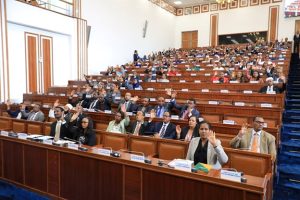
A lot has been witnessed in the past 12 months in Ethiopian politics. And most of the incidents have in them an element of hope and optimism. No one can doubt the remarkable change that has been taking place in the country following the commencement of an overall reform with a vision to realize democracy and inclusive development.
The release of imprisoned politicians and activists, the ever-growing progress in freedom of speech and the press, the restoration of diplomatic ties with Eritrea, the end of polarization and the beginning of constructive engagement among the Ethiopian Diaspora, the reconciliation between political and religious leaders, the return of exiled politicians and the Ethiopian Orthodox Church Synod in exile in the US have been the major positive incidents since the start of the reform.
Yet, for Ethiopia’s democratic experiment does not turn out to be a flash in the pan, a lot of hard work, commitment and determination are required to put in place strong and independent democratic institutions and culture among the public. And the sustainability of the reform will only be ensured by building strong democratic institutions and culture.
While installing or building a democratic culture is a long term process, the foundation for doing so is laid by building strong and independent democratic institutions. Ethiopia has now a government with a genuine commitment to democracy and what is lacking is the institutionalization of this good gesture.
That is why the ongoing reform in the country has given due emphasis to revitalize institutions so as to enable them to discharge the mandates given to them. For instance, repressive laws that are against independent civil society, freedom of the press and free and fair elections are being amended or reformed. Ethiopians are now seeing the light at the end of the tunnel.
On the other hand, it is amid-st of all these positive developments that we have also been witnessing conflicts and incidents of violence that break the hearts of many citizens. Some groups are trying to trigger conflicts and overturn the spirit for change and hope. And as a result of the violence that happened in different parts of the country, innocent lives have been lost, and millions of people have also been displaced.
This has also resulted in uncertainty about the public regarding the future. Hence, it is high time for the government to give prominence to the supremacy of the law. After being extensively occupied with political reforms, the government has announced that it would turn its face to economic reforms, the major ones being creating job opportunities and attracting local and foreign investment opportunities. This is also a commendable move as the people are desperately waiting to have a better life.
It is no doubt that the above mentioned bold reform moves have encouraged the public to actively engage in political and democratic discourse. But there is still one vital task ahead i.e. the continuous work of implanting democratic culture in citizens. The government, the public, civil societies, religious leaders and institutions, elders, social media users, and media professionals should also join hands and play their respective roles to sustain the pace of the reform.
All Ethiopians, particularly the elite and political leaders should prioritize the people and national interests than their personal interests. Everybody should take maximum care for not being trapped in the maze of those who are constantly engaged in sabotaging the reform by instigating violence and ethnic conflict.
Instead, the goal of all Ethiopians should be realizing democracy, development and fair distribution of the country’s resources. Failing to do so at this historical point in time would be a historic mistake.
The Ethiopian Herald, March 28/2019





